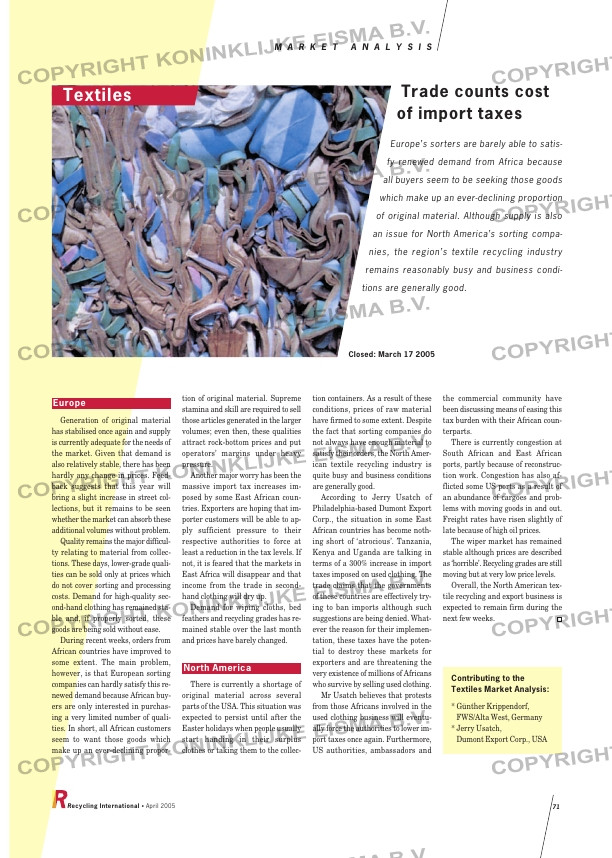Page 71 from: April 2005

Closed: March 17 2005
Europe’s sorters are barely able to satis-
fy renewed demand from Africa because
all buyers seem to be seeking those goods
which make up an ever-declining proportion
of original material. Although supply is also
an issue for North America’s sorting compa-
nies, the region’s texti le recycling industry
remains reasonably busy and business condi-
tions are generally good.
Trade counts cost
of import taxes
M A R K E T A N A L Y S I S
Textiles
Europe
Generation of original material
has stabilised once again and supply
is currently adequate for the needs of
the market. Given that demand is
also relatively stable, there has been
hardly any change in prices. Feed-
back suggests that this year will
bring a slight increase in street col-
lections, but it remains to be seen
whether the market can absorb these
additional volumes without problem.
Quality remains the major difficul-
ty relating to material from collec-
tions. These days, lower-grade quali-
ties can be sold only at prices which
do not cover sorting and processing
costs. Demand for high-quality sec-
ond-hand clothing has remained sta-
ble and, if properly sorted, these
goods are being sold without ease.
During recent weeks, orders from
African countries have improved to
some extent. The main problem,
however, is that European sorting
companies can hardly satisfy this re-
newed demand because African buy-
ers are only interested in purchas-
ing a very limited number of quali-
ties. In short, all African customers
seem to want those goods which
make up an ever-declining propor-
tion of original material. Supreme
stamina and skill are required to sell
those articles generated in the larger
volumes; even then, these qualities
attract rock-bottom prices and put
operators’ margins under heavy
pressure.
Another major worry has been the
massive import tax increases im-
posed by some East African coun-
tries. Exporters are hoping that im-
porter customers will be able to ap-
ply sufficient pressure to their
respective authorities to force at
least a reduction in the tax levels. If
not, it is feared that the markets in
East Africa will disappear and that
income from the trade in second-
hand clothing will dry up.
Demand for wiping cloths, bed
feathers and recycling grades has re-
mained stable over the last month
and prices have barely changed.
North America
There is currently a shortage of
original material across several
parts of the USA. This situation was
expected to persist until after the
Easter holidays when people usually
start handing in their surplus
clothes or taking them to the collec-
tion containers. As a result of these
conditions, prices of raw material
have firmed to some extent. Despite
the fact that sorting companies do
not always have enough material to
satisfy their orders, the North Amer-
ican textile recycling industry is
quite busy and business conditions
are generally good.
According to Jerry Usatch of
Philadelphia-based Dumont Export
Corp., the situation in some East
African countries has become noth-
ing short of ‘atrocious’. Tanzania,
Kenya and Uganda are talking in
terms of a 300% increase in import
taxes imposed on used clothing. The
trade claims that the governments
of these countries are effectively try-
ing to ban imports although such
suggestions are being denied. What-
ever the reason for their implemen-
tation, these taxes have the poten-
tial to destroy these markets for
exporters and are threatening the
very existence of millions of Africans
who survive by selling used clothing.
Mr Usatch believes that protests
from those Africans involved in the
used clothing business will eventu-
ally force the authorities to lower im-
port taxes once again. Furthermore,
US authorities, ambassadors and
the commercial community have
been discussing means of easing this
tax burden with their African coun-
terparts.
There is currently congestion at
South African and East African
ports, partly because of reconstruc-
tion work. Congestion has also af-
flicted some US ports as a result of
an abundance of cargoes and prob-
lems with moving goods in and out.
Freight rates have risen slightly of
late because of high oil prices.
The wiper market has remained
stable although prices are described
as ‘horrible’. Recycling grades are still
moving but at very low price levels.
Overall, the North American tex-
tile recycling and export business is
expected to remain firm during the
next few weeks.
Contributing to the
Textiles Market Analysis:
* Günther Krippendorf,
FWS/Alta West, Germany
* Jerry Usatch,
Dumont Export Corp., USA
Recycling International • April 2005 71



